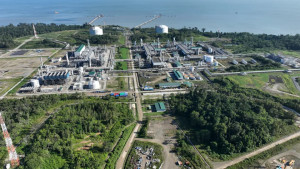British Energy giant bp and Mitsubishi Research Institute (MRI) have been selected by Japan’s Ministry of Economy, Trade, and Industry (METI) to conduct a feasibility study on developing a Carbon Capture, Utilization and Storage (CCUS) methodology under the Joint Crediting Mechanism (JCM) framework.
The initiative marks a major step toward recognizing CCUS as a viable decarbonization option that can generate carbon credits under the JCM scheme, leveraging bp’s Tangguh CCUS facility in West Papua as the central pilot site.
According to bp, the study aims to design a methodology that enables domestic CO₂ emitters in Indonesia, particularly those involving Japanese investment, to earn carbon credits in the future through the capture and injection of emissions into the Tangguh CCUS facility.
“The proposed methodology will define how CCUS and Enhanced Gas Recovery (EGR) projects can be implemented, monitored, and verified under JCM standards,” bp said in a statement obtained by Indonesia Business Post on Thursday, October 16, 2025.
“It will ensure transparent accounting and reporting of carbon captured and stored, paving the way for internationally recognized credit generation,” the company cited.
Indonesia and Japan first signed the JCM Partnership Agreement in 2013, enabling both countries to collaborate on emissions reduction projects.
The Joint Crediting Mechanism Guidelines for Developing Proposed Methodology for CCS and CCUS were officially adopted in December 2024 during the 10thJoint Committee Meeting in Jakarta, providing the regulatory foundation for this new phase of cooperation.
The feasibility study also supports Indonesia’s net-zero emissions target by 2060, while reinforcing Japan’s commitment to cross-border decarbonization collaboration. Through the project, bp and MRI aim to build a scalable framework that allows industries to capture, transport, and store CO₂, establishing CCUS as a cornerstone of Asia’s clean energy transition.
“With our partners and government support, bp is committed to advancing CCUS deployment as an effective large-scale emission reduction solution across the region,” bp said.
The study is expected to shape future CCUS investment mechanisms under JCM, potentially positioning Indonesia as one of the key hubs for regional carbon storage and credit generation in Asia-Pacific.


AloJapan.com